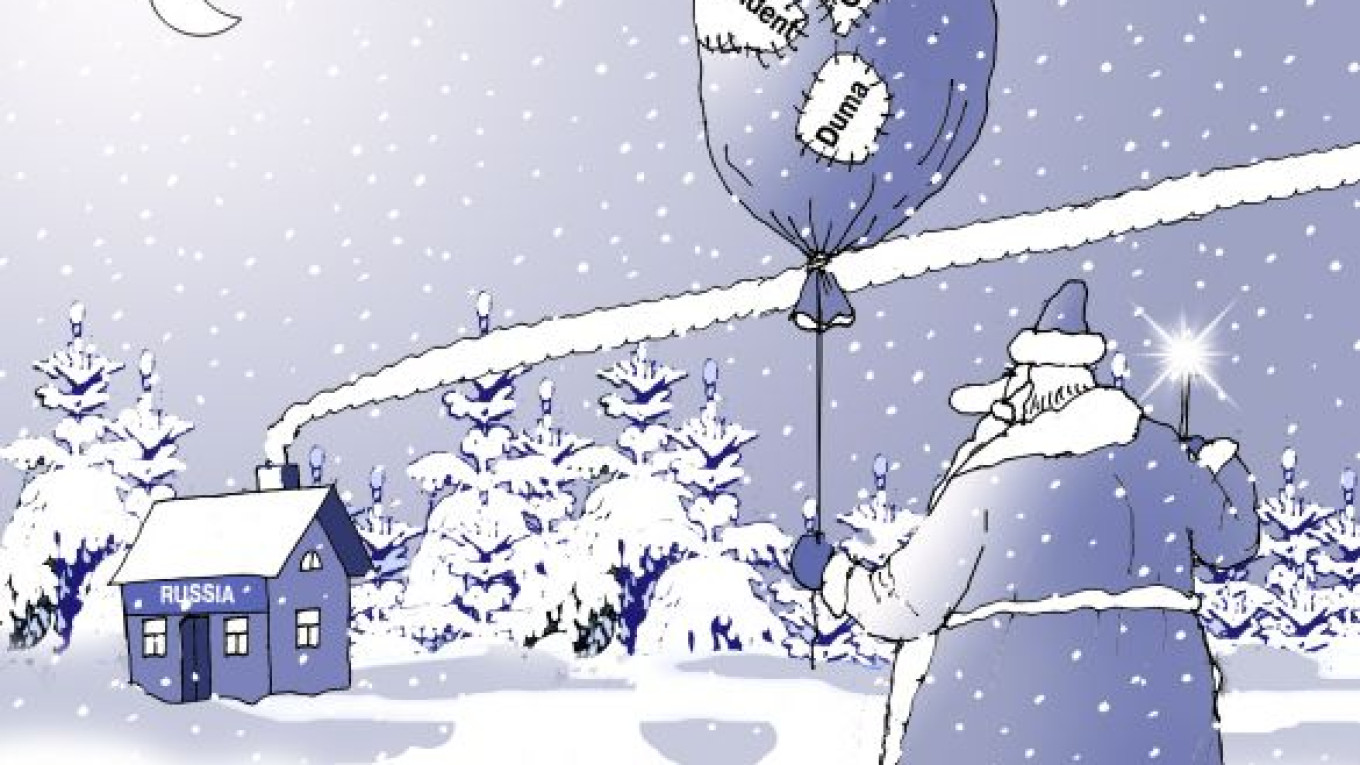It is already clear that Russia will experience a systemic political crisis in 2012. The country's leaders and institutions will completely lose the people's trust by next summer. The authorities will become vacillating and weak and will flounder from one crisis to another.
The State Duma will be led by Prime Minister Vladimir Putin's crony and purported former KGB operative Sergei Naryshkin — an even more colorless speaker than his predecessor, Boris Gryzlov. The parliament will thus be fully stripped of any legitimacy in the eyes of the people and will fail to reflect both the real disposition of political forces in the country and the public mood in general.
United Russia, the "party of crooks and thieves," will occupy 238 Duma seats, although it actually earned at most 35 percent of the vote, or 160 seats.
The Kremlin-sanctioned "opposition" parties — the Communist Party, A Just Russia and the Liberal Democratic Party — betrayed voters who voted for them as a protest against United Russia. Unmotivated to challenge the election results or demand a recount, the servile "opposition" recognized and attempted to legitimize United Russia's fraudulent victory. Thus, the three minority parties failed to exploit the very real opportunity they had to gain a majority in the Duma and fulfill their many campaign promises to voters. And so, as many observers predicted would happen, the strategy of "voting for anyone but United Russia" only translated into votes for Putin and his party.
But such cowardly conduct by the obsequious "opposition" did not go unnoticed by an angry and vocal public. At the demonstration on Bolotnaya Ploshchad, protesters responded to speeches by Community Party and Just Russia leaders with chants of "Hand over your mandates!" Of course, their demand was not met. With the Kremlin's pocket opposition discrediting itself by its unwillingness to challenge the authorities, it only exacerbated the political crisis that is certain to erupt in 2012.
Even in November, Putin's approval rating had fallen to 51 percent according to a VTsIOM poll, and his trust rating plummeted to 25 percent on Dec. 10, when the Bolotnaya Ploshchad protests took place. These trends are likely to continue, and by the time the presidential election is held on March 4 Putin's approval rating will probably be no more than 30 percent. This means that any one of Putin's hand-picked running mates for the presidential race — Gennady Zyuganov, Vladimir Zhirinovsky, Sergei Mironov, Grigory Yavlinsky or Mikhail Prokhorov — could actually receive enough protest votes from disgruntled citizens to beat Putin in the runoff vote.
This leaves Putin no choice but to even more brazenly and recklessly employ every administrative resource at his disposal to organize massive falsification of the election results in March. To receive the 55 percent to 60 percent of the vote that he wants, Putin would have to fabricate almost as many votes as he actually receives. But after the blatant violations during the Duma election campaign and Dec. 4 elections, the people are well prepared for more tricks, such as "carousels," absentee ballots and other methods to stuff the ballots, in March. More violations will be caught on video and placed on the Internet.
Starting on March 5, the day after the presidential election, we can expect to see mass protests that will dwarf the recent rally on Bolotnaya Ploshchad.
During Thursday's annual call-in show, Putin showed that he does not have a modern political or economic agenda. He once again talked about foreign powers plotting against Russia and, at the same time, had no answers concerning the most important issues affecting the country's development: the creation of an effective democratic political system, the elimination of rampant corruption, establishing rule of law and diversifying the economy. At this point, society will simply reject any pseudo institutions that Putin and his chief ideologist, Vladislav Surkov, dream up as legitimate. This will only lead to more protests across the country. The weak and unpopular government will have to resort to populist measures, such as increasing government handouts, which will only make matters worse for the economy.
By clinging to power, Putin and his corrupt clan have created a serious, crippling crisis of confidence in government and the political system as a whole. Society must now do all it can to ensure that this crisis does not lead to the country's collapse.
Vladimir Ryzhkov, a State Duma deputy from 1993 to 2007, hosts a political talk show on Ekho Moskvy radio and is a co-founder of the opposition Party of People's Freedom.
A Message from The Moscow Times:
Dear readers,
We are facing unprecedented challenges. Russia's Prosecutor General's Office has designated The Moscow Times as an "undesirable" organization, criminalizing our work and putting our staff at risk of prosecution. This follows our earlier unjust labeling as a "foreign agent."
These actions are direct attempts to silence independent journalism in Russia. The authorities claim our work "discredits the decisions of the Russian leadership." We see things differently: we strive to provide accurate, unbiased reporting on Russia.
We, the journalists of The Moscow Times, refuse to be silenced. But to continue our work, we need your help.
Your support, no matter how small, makes a world of difference. If you can, please support us monthly starting from just $2. It's quick to set up, and every contribution makes a significant impact.
By supporting The Moscow Times, you're defending open, independent journalism in the face of repression. Thank you for standing with us.
Remind me later.


